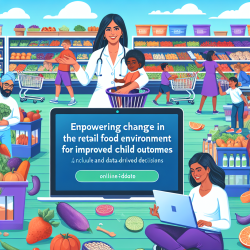Empowering Children's Futures: The Impact of Discrimination on Health
As practitioners dedicated to creating positive outcomes for children, it is crucial to understand the broader factors that influence their health and development. One such factor, as highlighted in the research article "Understanding how discrimination can affect health" by Williams et al. (2019), is the pervasive impact of discrimination. This blog aims to distill key findings from this research and provide actionable insights for practitioners working with children.
Understanding the Research
The study by Williams et al. (2019) provides a comprehensive review of empirical research linking self-reports of racial discrimination to health outcomes. The review includes 29 studies conducted between January 2013 and 2019, examining both domestic and international contexts. The findings indicate that experiences of discrimination are adversely related to mental health and physical health indicators, including preclinical markers of disease, health behaviors, care utilization, and adherence to medical regimens.
Notably, the research also highlights the impact of discrimination on children and adolescents. Emerging evidence suggests that discrimination can affect their health, with some adverse effects potentially mitigated by psychosocial resources. This underscores the importance of a supportive environment in buffering the negative impacts of discrimination.
Implications for Practitioners
As practitioners, integrating these findings into our work can enhance our ability to support children effectively. Here are some strategies to consider:
- Awareness and Sensitivity: Recognize the signs of discrimination and its potential impact on a child's health and well-being. This includes being mindful of the child's cultural background and experiences.
- Creating a Safe Space: Foster an inclusive and supportive environment where children feel safe to express their experiences and emotions. This can help mitigate the adverse effects of discrimination.
- Collaboration with Families: Engage with families to understand the child's context and provide resources that can support both the child and the family in dealing with discrimination.
- Advocacy: Advocate for policies and practices within schools and communities that promote equity and reduce discrimination. This includes working with school administrators to implement anti-discrimination policies and programs.
- Continued Education: Stay informed about the latest research on discrimination and health. This can help in developing evidence-based interventions and strategies to support children.
Encouraging Further Research
While the findings from Williams et al. (2019) provide valuable insights, there is still much to learn about the optimal interventions that can reduce the negative effects of discrimination. Practitioners are encouraged to engage in further research and contribute to the growing body of knowledge in this area. This can involve participating in studies, collaborating with researchers, or even conducting independent research within your practice.
Conclusion
Understanding the impact of discrimination on health is essential for creating positive outcomes for children. By integrating the findings from Williams et al. (2019) into our practice, we can better support the children we work with and advocate for a more equitable and inclusive environment. To read the original research paper, please follow this link: Understanding how discrimination can affect health.










